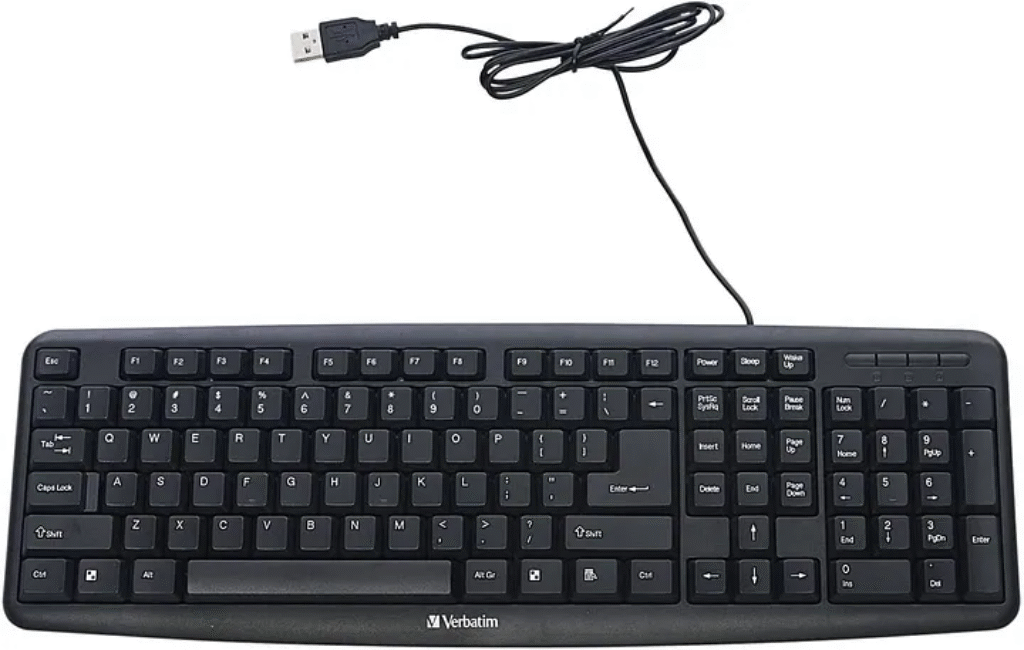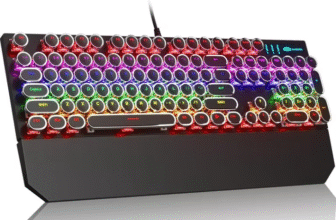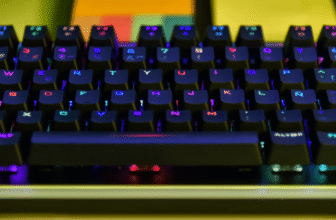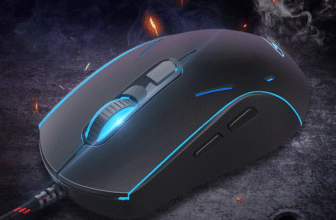Shopping for a new keyboard can feel like decoding a secret language. You’re faced with a choice between a “mechanical” keyboard and a “normal” one, but what does that even mean? The core of this decision lies in the technology that registers your every keystroke.
The choice of a mechanical vs. membrane keyboard is the single most important factor that will determine how your keyboard feels, performs, and lasts. This definitive guide will break down the differences to help you invest in the perfect keyboard for your typing, gaming, and budget needs.
- What’s the Real Difference Between a Mechanical and a Membrane Keyboard?
- Mechanical vs. Membrane Keyboard: A Head-to-Head Comparison
- What Is a Mechanical Keyboard? A Deeper Look
- What Is a Normal Keyboard? (The Membrane Explained)
- How to Tell if a Keyboard is Mechanical?
- Which Lasts Longer, Mechanical or Membrane? (Durability Breakdown)
- Are Mechanical Keyboards Better?
- Keyboard Glossary: Answering Your Other Questions
- Conclusion: Making the Final Decision
What’s the Real Difference Between a Mechanical and a Membrane Keyboard?

The main difference between a mechanical keyboard and a regular keyboard (which is usually a membrane keyboard) is the mechanism beneath the keys. A mechanical keyboard uses individual, spring-loaded switches for every key. In contrast, a membrane keyboard uses a single, connected rubber sheet with domes that provide the “spring” for all the keys.
This fundamental difference in construction impacts everything from the typing feel and durability to the sound and price.
💰Save More with Our Discounts & Coupons!
Mechanical vs. Membrane Keyboard: A Head-to-Head Comparison
For a quick overview, this table breaks down the key distinctions. This is snippet-bait gold.
| Feature | Mechanical Keyboards | Membrane Keyboards |
|---|---|---|
| Typing Feel | Distinct, responsive, and tactile feedback. | Soft, quiet, and sometimes described as “mushy.” |
| Performance | High precision and faster actuation for competitive gaming. | Slower response; requires a full press to register a key. |
| Durability & Lifespan | Extremely durable, with high-quality switches rated for 50 to 100 million keystrokes. | Lower durability; membrane layers can wear out over time. |
| Sound | Varies from near-silent to loud and “clicky” depending on the switches. | Very quiet, making them ideal for office environments. |
| Customization | Highly customizable with different switches, keycaps, and cases. | Little to no options for customization. |
| Price | Higher upfront cost but can be a better long-term value. | Very affordable and budget-friendly. |
| Maintenance | Easy to clean and repair; individual switches can be replaced. | Difficult to clean or repair due to the sealed one-piece design. |
What Is a Mechanical Keyboard? A Deeper Look
A mechanical keyboard’s meaning comes from its core component: the switch. Each key has its own complete mechanical switch assembly. When you press a key, you are physically closing an electrical circuit within that individual switch.
The beauty of a mechanical keyboard lies in the variety of these switches, which determine the feel and sound. They generally fall into three categories:
- Linear Switches (e.g., Cherry MX Red): Smooth and consistent with no bump or click. They are prized by gamers for their fast, unobstructed keystrokes.
- Tactile Switches (e.g., Cherry MX Brown): Provide a noticeable “bump” when the key is activated, offering excellent tactile feedback for typing without an audible click.
- Clicky Switches (e.g., Cherry MX Blue): Offer both a tactile bump and a distinct, audible “click” sound. Many typists love this satisfying feedback, but it can be loud for shared spaces.
This ability to choose your preferred feel is a major advantage and a core part of the mechanical keyboard experience.
💰Save More with Our Discounts & Coupons!
What Is a Normal Keyboard? (The Membrane Explained)

When people search for “mechanical keyboard vs regular keyboard,” the “regular” model they’re thinking of is almost always a membrane keyboard. These use a simple, three-layer design: a top membrane layer with conductive traces, a middle spacer layer, and a bottom membrane layer.
When you press a key, a rubber dome collapses, pushing the top membrane layer through a hole in the spacer to make contact with the bottom layer, completing the circuit. While less sophisticated, this design makes the classic membrane keyboard an extremely cost-effective solution for manufacturers and consumers.
How to Tell if a Keyboard is Mechanical?
Not sure what you’re currently using? Here are three easy ways to find out if your keyboard is mechanical.
- By Feel and Sound: A mechanical keyboard will almost always have a more defined, crisp, and substantial feel. Even quiet linear switches feel smoother than the slightly soft or “mushy” feel of a typical membrane keyboard.
- Pull Off a Keycap: The surest way is to gently pull a keycap off (like an arrow key or Escape key). If you see an individual, contained switch with a cross-shaped stem (or similar), you have a mechanical keyboard. If you see a simple rubber dome or cup, it’s a membrane keyboard.
- Check the Model Number: A quick Google search of the model number on the back of your keyboard will usually give you a definitive answer on its specifications.
💰Save More with Our Discounts & Coupons!
Which Lasts Longer, Mechanical or Membrane? (Durability Breakdown)
When it comes to durability and lifespan, there is no contest. Mechanical keyboards last significantly longer.
The high-quality switches in a mechanical keyboard are engineered for extreme use, rated for tens of millions of presses. This robust construction means they maintain their feel and performance for years. In contrast, the rubber domes in a membrane keyboard degrade over time, leading to unresponsive keys and a loss of tactile feedback. The longevity of a mechanical keyboard is a key reason for its higher price.
Are Mechanical Keyboards Better?
This is the big question. For performance-focused tasks like gaming and extensive typing, the answer is yes, mechanical keyboards are better.
- For Gaming: Gamers gain a competitive advantage from a mechanical keyboard. The precise and rapid actuation of the switches means faster response times. Key features like anti-ghosting and N-key rollover, standard on most gaming keyboards, ensure every command is registered perfectly.
- For Typing & Office Work: For professional writers, coders, and anyone who spends all day typing, the benefits are immense. The clear tactile feedback improves accuracy and can reduce finger fatigue. The long-term durability also makes a mechanical keyboard a wise investment for heavy use. However, if silence is your priority in an office, a quiet tactile or linear switch is essential.
💰Save More with Our Discounts & Coupons!
Keyboard Glossary: Answering Your Other Questions
Here are quick answers to other common keyboard questions.
A mechanical-membrane (or “mecha-membrane”) keyboard is a hybrid that tries to offer the best of both worlds. It uses a membrane design but incorporates a mechanical-style clicker to provide better tactile feedback and sound than a standard membrane keyboard, but at a lower cost than a true mechanical one.
Flat-profile keyboards are most often called Chiclet keyboards (like those on laptops) or scissor-switch keyboards, which use a stabilizing X-shaped mechanism under each key for a low-profile and stable press.
This refers to a design style where the switches are mounted directly on the top plate of the keyboard case, with no surrounding bezel. This makes the keys appear to “float” above the base and is popular for its aesthetics and ease of cleaning.
A stealth keyboard is a mechanical keyboard that features unmarked or “blank” keycaps. This provides a clean, minimalist look and is favored by expert typists who don’t need to look at their keys.
This is another name for any keyboard that has illumination behind the keys, with “black light” often specifically referring to UV or purple lighting, as opposed to standard RGB backlighting.
💰Save More with Our Discounts & Coupons!
Conclusion: Making the Final Decision
Choosing between a mechanical keyboard vs membrane keyboard boils down to your personal priorities: performance vs. affordability, and feel vs. silence.
- Choose a Mechanical Keyboard if: You are a serious gamer, a dedicated typist, or a programmer who values superior feel, peak performance, long-term durability, and customization.
- Choose a Membrane Keyboard if: You are a casual user, need a quiet keyboard for a shared space, are on a strict budget, or prioritize portability and spill resistance.
Now that you’re armed with this knowledge, you can confidently find the keyboard that will truly elevate your desktop experience.






